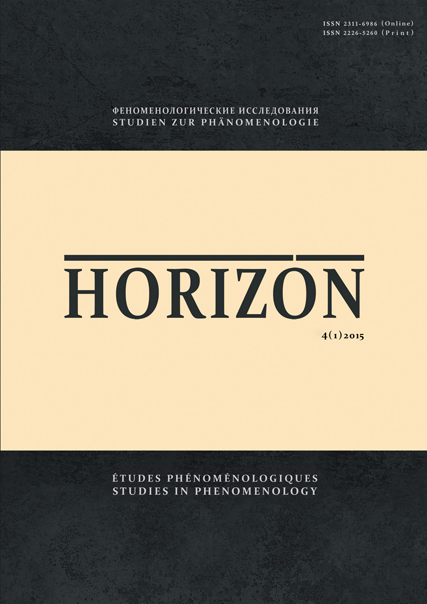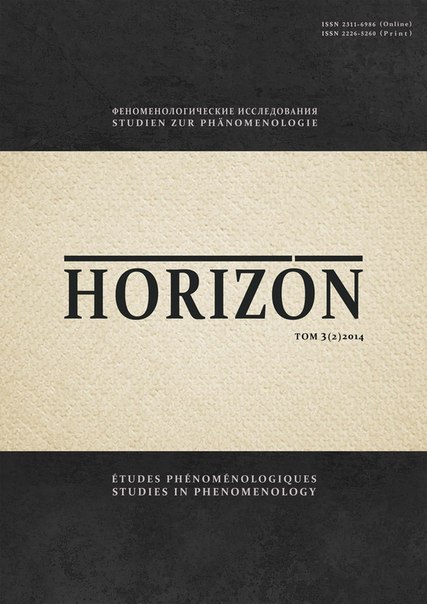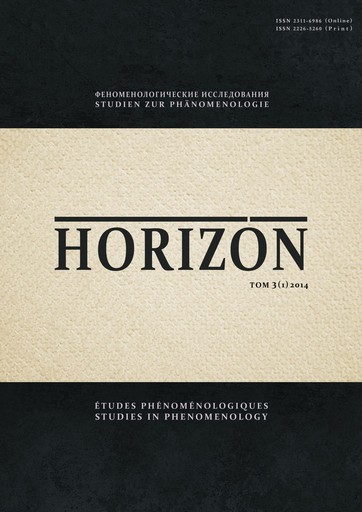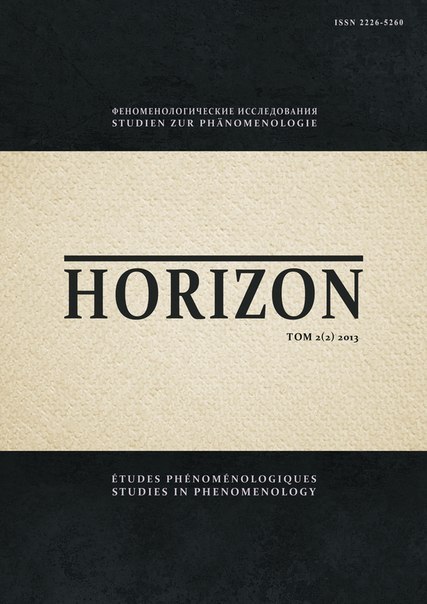
We kindly inform you that, as long as the subject affiliation of our 300.000+ articles is in progress, you might get unsufficient or no results on your third level or second level search. In this case, please broaden your search criteria.


The review addresses the clue aspects of the book. Namely, the review concerns the conception of experientialself on different levels of inquiry, analyses models of intersubjectivity in phenomenologicaltradition, the nature of shame from interdisciplinary perspective. Also, the reviewer notices the author’semphasize on relationship between phenomenology and other scientific traditions. The author discussesthe interdisciplinary approach to the problem. As such, the author considers antirealist positionto the problem of the self, arguing about its inconsistency in relation to the phenomenologically elaboratedconception of experiential minimal self. Various conceptions of identity are also under the interestin first part of the book.
More...
In New phenomenology in France, László Tengelyi invites us to think about the transformed relationship between the notions of possibility and reality in the contemporary French phenomenology. To justify his thesis, he proposes to examine Marc Richir’s criticism of «transcendental Ideals» in Husserl’s and Heidegger’s phenomenology. In considering, next to Tengelyi, Richir’s revisit of phenomenology as an extension of the Kantian criticism of ontotheological metaphysics, the present study aims to develop three main ideas. First, it scrutinizes Kantian criticism of the ontological argument in Critique of Pure Reason. The ontological argument considers transcendental Ideal as a reality, with there being confusion between an object of pure thinking and one of knowledge. Second, this study aims to clarify the way in which Richir also applies Kantian criticism to Husserl’s transcendental eidetics as well as to Heidegger’s existential analytic, in Experience of Thinking – Phenomenology, Philosophy,Mythology and Phantasia, Imagination, Affecitivity. On the one hand, by analyzing Husserlian manuscripts on transcendental intersubjectivity, Richir uncovers a disguised form of the transcendental Ideal, incorporated in the notion of form of essence or«Eidos» of the existing I; this notion is presupposed as a condition of passage from the possibility to the reality of the Other. On the other hand, Richir discovers in the Heideggerian description of «anticipation of death» in Being and Time, a dissimulated concept of the transcendental Ideal that takes a form of the Dasein’s «ownmost» [eigenst] factual possibility. Ultimately, the main purpose of the current study is to show that contemporary French phenomenology intends to release itself from the transcendental Ideal, which is considered a reality that presupposes the total sum of possibilities.
More...
This article exposes a tension within Sartre’s Philosophy and his concept of praxis in relation with the role to be played by the flesh and the dimension of passivity. Our guideline will be the theory of passive activity that Sartre develops in The Family Idiot.We will wonder how action may emerge at the heart of a flesh that is inseparable from a familial and social milieu whose power of conditioning is so profound that Sartre calls it a destiny. Is the specific form taken by praxis in Flaubert’s existence – namely a passive activity – to be regarded as a weakened form of praxis? Should we contrast passive activity and sheer praxis? Secondary and primary praxis? Parasitism and revolt? We will first show in this article, by studying Sartre’s analyses regarding the flesh in Being and Nothingness and in The Family Idiot, that the capacity for action cannot be reduced to a metaphysical nothingness:the temporal ekstasis that defines every existent becomes a capacity for praxis only from within the flesh, a flesh that is still prior to the separation between the mother and the child. According to Sartre, a process of polarization and attunement, the institution of rhythms and dynamisms then give birth to a subject capable either of outright praxis or, as in Flaubert’s case, only of passive praxis. The discovery of an essential link between praxis and fleshly dynamism will lead us, secondly, to question the role that passivity may always play in activity and to reappraise passive activity. In this regard Sartre’s reflections develop along two different directions and pose a problem. On the one hand, Sartre makes clearly known his disagreement with Flaubert’s thesis that praxis is impossible and revolt useless. On the other hand, he demonstrates that Flaubert invented a passive activity that possesses a genuine power of subversion. We will contend that the tendency to apprehend passive and active activities in terms of dualism and hierarchy is to be overcome. There must be an essential continuity between them, to such an extent that passive activity is the key for all revolution.
More...
The problem addressed in this paper is the genesis of the empathetic, intersubjective intentionality which underlies second person interactions. This theme is one of the most intriguing in contemporary philosophy and interdisciplinary research.The article seeks to elucidate the foundations of the phenomenon of the оther which we always already have in our daily embodied practices. First, we present a critical analysis of some aspects of the theory of intersubjectivity, such as analogical inference, anonymity of intersubjective being, inaccessibility of immediate experience of the Other. Then, based on such topics,as corporeity, the enactive nature of subjectivity, historical and social aspects of subjectivity, we elaborate the concept of empathy as lying at the very foundation of any encounter with the Other. As a result, we demonstrate the closeness of Husserlian idea of non-objectifying intentionality to the empathetic approach in contemporary philosophy. As precursors of the latter we mention M. Buber, L. Wittgenstein, M. Sheler, who advocate the dialogical (second-person) structure of consciousness and its em/sympathetic nature. We also present an interpretation of empathy as an exclusive and unique form of intentional relation (E.Thompson) which permits to experience the Other in а direct, immediate way from second-person perspective (Sh. Gallagher).The analysis of empathy is also promising for contemporary interdisciplinary studies of affective consciousness, which are also mentioned. The article stresses the necessity of further studying «being-with» in both phenomenological and interdisciplinary dimensions to the extent that intersubjectivity constitutes the sense of the self on both transcendental and experiential levels.
More...
Husserl was the first to clarify the specificity of the phenomenological realm. A phenomenon is an articulated whole whose intensity and richness are parallel to its purity. It is under the guidance of this coalescence that we re-examine the final clause of the Principle of principles («Ideen» I, § 24), often misinterpreted as a limitation of phenomenality. However, Richir’s phenomenology of the nothing-but-phenomenon («rien que phenomena») remains faithful to the final clause of the Principle of principles in that it does not surpass the (nothing-but-) phenomenon in the name of any extra-phenomenological instance. Contrary to the apperceptions emerging from symbolic institution, the nothing-but-phenomenon takes place in the element of a concrete indeterminacy that phenomenalizes itself according to a reflexivity (intrinsic to the phenomenon) that develops itself all along an essentially transpassible phase of presence. Therefore, phenomenalization takes the form of a flickering (clignotement) that, in its final state, becomes autonomous and calls up subjectivity itself. Linked to the hyperbolic épochè, the vertigo of this autonomization outlines what Richir calls the beyond copernican turn (l’au-delà du renversement copernicien) leading thereby toa non-standard phenomenology, which takes the form of an architectonic of the various levels of phenomenalization.
More...


This paper aims at analysing, in a phenomenological perspective, how meaning occurs in literaryreadings as well as in literary discussions. The study takes as its empirical starting pointa seminar session, in which several academic readers have shared their experiences of thesame novel. It appeared that the constitution of the novel’s meaning was modified and continuedduring the discussion and, therefore, that the meaning of the novel was not availablebefore the discussion happened. Then, to understand what happened before the discussion,the inquiry relies on P. Bayard’s theoretical elaborations, which state that the solitary experienceof reading itself involves previous readings: the subjectivity of the reader is haunted bya plurality of texts, virtually involved in the process of reading of the novel. Therefore, thearticle intends to explore the notion of potential space, coined by Winnicott, and to define it asan intersubjective space, made of virtual subjectivities. Ultimately, to describe the way a newmeaning has arisen between the participants, the study relies on M. Richir’s phenomenology.The point, here, is to question the actual but unconscious interweaving of the subjectivitiesin the discussion. Thus, the study provides a deeper understanding of the creativity of the actof reading, by assuming that creativity cannot happen without a plurality of subjectivities,existing or virtual.
More...
This paper holds that the philosophical relation between Husserl’s and Fink’s phenomenologicalphilosophies can be characterized in terms of proximity and distance. We proceed byfocusing on the philosophical foundation of their projects and, in particular, on the Kantiannotion of “transcendental illusion”, which they use, though in different manners, as a wayof determining purely philosophical illusions — a preliminary task to found transcendentalphenomenology proper. We select this Kantian notion as a central theme inasmuch as itconcerns the metaphysical problematic of the world. Our analysis shows that Fink defendsthe Husserlian thesis that the world is not merely an “idea of pure reason” (Kant), but anexperience. In effect, the world is necessarily pregiven to us, though anonymously, in anintentional experience; in other words, intentional experience without the pregiven worldis, according to the late Husserl, unthinkable. Fink’s characterization of world-experience isradically different from Husserl’s. This difference or distance comes from Fink’s conceptionof “enworlding” (Verweltlichung), i. e., the self-actualization of constituting subjectivity inthe world-actualization. Fink’s very idea of this type of correlation has two specific enablingfunctions: (1) the world’s originally enframing function (die ursprünglich einrahmende Funktion)of the entity into the world itself and (2) the event-like character of the “intruding” (Eindringen)of the subject into the world. Therefore, we conclude that Fink’s phenomenologicalcontribution to philosophy consists not only in his genuine reflection on, and analysis of, thephenomenological conception of correlation at the deep level of world-experience, but alsoin his metaphysical reformulation of the traditional concept of the world.
More...
When discussing Husserl’s phenomenology, it is often divided into separate stages which haveno internal relationship between them. Husserl’s anti-psychologism can be opposed to phenomenologicalpsychology, anti-historicism to unfolding of inter-subjective historical worlds,the concept of phenomenology as strict science to criticism of science from the perspective oftranscendental self-experience, though by looking for contradictions, we will see only separateaspects of phenomenology and will not notice the general structure of phenomenology.In order to understand the meaning of Husserl’s phenomenology, it is necessary to find theunifying thread connecting different elements and levels of phenomenology. When discussingthe genesis of phenomenological philosophy, we should not emphasise differences betweenseparate stages, but understand what relates them. In this article the whole of Husserl’s phenomenologywas reconstructed following the common intention of phenomenology which Iunderstood as criticism of objectivism and naturalism. This intention can be found at all stagesof Husserl’s phenomenology.
More...
This paper deals with the problem of practical intentionality in the transcendental phenomenologyof Husserl. Firstly, through the analysis of a passage found in “Logical Investigations”, the authorwill show Husserl’s earlier position with respect to the problem of practical intentionality. He willthen go on to critically assess this position and, with reference to some of Husserl’s works writtenafter the 1920’s, prove that every intentionality should be regarded as practical intentionality. Correspondingly,transcendental phenomenology should also be characterized as practical philosophy.The author makes this statement with the following two senses in mind; transcendental phenomenologyis practical philosophy, firstl, in the sense that it investigates various forms of practicalintentionality and, secondly, in the sense that transcendental intentionality as the grounding sourceof transcendental phenomenology is also a kind of practical intentionality.
More...

(ПРОДОЛЖЕНИЕ. НАЧАЛО В ТОМЕ 2(2) 2013)
The second part of the chapter eight of the “Rule of Metaphor” deals with further philosophicalimplications of the metaphor. Ricoeur dissipates any suspicion of complicity betweenthe metaphorical and metaphysical. He shows that it is due to a wrong understandingof the metaphor as embedded in nomination, while its proper place, as Ricoeur insists,is in discourse. The living metaphor is a principle animating thought and inciting it “tothink more”. The very relationship between thought and poetry, between speculative andmetaphorical discourses proves to be a dynamic process based on the dialectics betweenthe poetical experience of belonging and the speculative power of distancing.
More...
Санкт-Петербургский государственный университет 12 сентября 2013 г.
This is the text of an interview given by professor of department of logic of the philosophicalfaculty St. Petersburg State University Yaroslav A. Slinin to Natalia Artemenko and AndreiPatkul. Prof. Slinin talks about the genesis of his philosophical views, in particular, abouthis way into phenomenology. His recollections of the phenomenological community in theformer Leningrad is of very interest in the context of Soviet philosophy’s historiography. Itought to remarked that the course under the titled «Phenomenology and Logic» deliveredby Prof. Slinin since 1970 brought to bear overwhelming influence on the shaping of today’sphilosophical community in St. Petersburg.Hence, the problems of correlation between phenomenology and logic are discussed inthis interview. Prof. Slinin points that the problematic of logic is the confluence point ofphenomenology and analytical philosophy, which deal with the same problems but by differentmethods and in different attitudes. The main distinction points between these twophilosophical trends are, on the one hand, that phenomenology has a metaphysical background,which is denied by representatives of classical analytical philosophy, and on theother hand, that phenomenologists as distinguished from analytical philosophers acceptthe intellectual intuition of essences. Prof. Slinin states with regard to correlation betweenphenomenology and contemporary cognitive sciences that the Husserl’s distinction of transcendentaland natural attitudes is very important up to now. He gives his own interpretationof Husserl’s doctrine of reduction in this context. Prof. Slinin tries to show also thatHeidegger describes by ontological terms the same phenomena which are described byHusserl in transcendental terms.As conclusion, Prof. Slinin talk about his other non-phenomenological interests in philosophy,namely, about ancient philosophy (particularly, in its connection with phenomenology),patristic, early modern and Russian philosophy.
More...
The paper contains few reflections based on the Dmitry Fedchuk’s article published in thevolume 2 (2) 2013 of “Horizon. Studies in Phenomenology” under the title “Scholastic Distinctionin Finite Being and Ontological Difference”. The Fedchuk’s theses that the entity butnot the being as such has to be the proper subject of ontology and that the Heidegger’s attemptto express by the notions the sense of the being as such was unsuccessful are secondedhere. Two points of Fedchuk’s view of Heidegger’s failure are emphasized also, namely, Heidegger’sabstractions of pure being from entities by the ontological difference as well as hisreduction of the being to its giveness in the human understanding (Heidegger’s idealism).But it is pointed also that Fedchuk’s argumentation in his attack on Heidegger isn’t alwayssufficient. For example Fedchuk don’t notice that Heidegger believes that the being is alwaysthe being of entities and therefore his fundamental ontology should lead to the building ofso-called metontology.
More...

4–6 декабря 2014 года Архив Гуссерля в Лёвене
More...
The paper defends the thesis that phenomenological methods can play key role in explications of thetransformation reasons of philosophical images of science. It can be made by the comparative analysisamong phenomenology and other approaches revealing strong and weaknesses of separate approaches.Such principles of an explication of the transformation reasons of philosophical images of sciencewere allocated: 1) the science is a set of the idealizing consciousness attitudes which allow to build imagesof the world in borders of regional ontologies (or «particular ways of understanding of reality»);2) idealizing attitudes correspond to the comprehension of intentionality experiences structures; 3) thegeneral transformation reason of images of science is the change of consciousness attitudes.
More...
The article maintains that the being (ens) is the proper subject of metaphysics, not being at all (esse). Itis demonstrated by way of comparison of two different contexts. The first one is scholastic distinctionin finite being, and the second one — the ontological difference by Martin Heidegger, which is foundedon the first. Duns Scotus and Francisco Suarez shows that the content of being (esse), as a result ofdifference between essence and existence, cannot be explicated in logos. It is accessible in the modesof the giveness of essence, of its presence. Heidegger discusses the possible access to being through itsdifference from a being, in situation when Desein understands being (esse) by way of own actual existence.Nevertheless, Dasein cannot articulate the meaning of being, because the later, as a principiumof temporality and of consciousness, always is concealed from reflection. Being is the source of any definitenessfor the subject; it is an absolute beginning. That is why being cannot have the definite contentfor thought. In its meaning being is nothing and for us it discovers itself mediately — from essence andthe modes of essence, i.e. by way of the being (ens).
More...